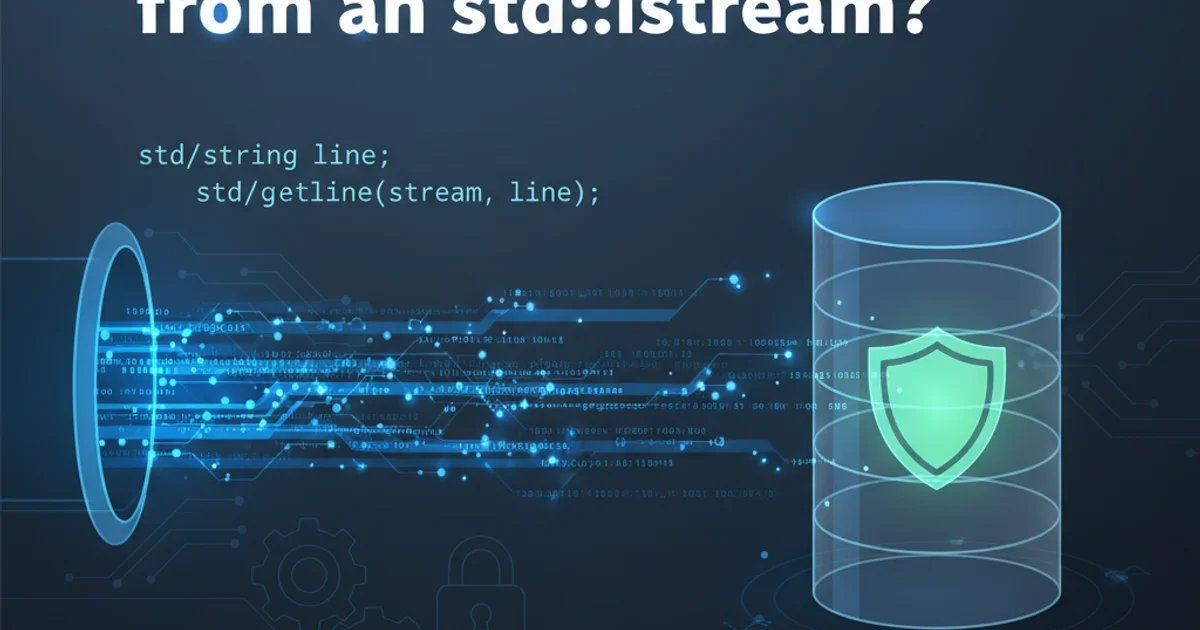How to safely read a line from an std::istream?
Categories:
Safely Reading a Line from std::istream in C++

Learn the robust and error-safe methods for reading entire lines of text from std::istream objects in C++, covering common pitfalls and best practices.
Reading a line of text from an input stream is a fundamental operation in C++ programming. However, doing it safely and correctly, especially when dealing with potential errors, end-of-file conditions, or unexpected input, requires careful consideration. This article explores the most common and robust techniques for reading lines from std::istream (which includes std::cin and std::ifstream), highlighting their advantages and how to handle various scenarios.
The std::getline Function
The std::getline function is the preferred method for reading an entire line from an input stream, including any whitespace characters, until a newline character is encountered. It's part of the <string> header and comes in two main overloads: one that takes an std::istream and an std::string, and another that also accepts a delimiter character.
#include <iostream>
#include <string>
int main() {
std::string line;
std::cout << "Enter a line of text: ";
if (std::getline(std::cin, line)) {
std::cout << "You entered: " << line << std::endl;
} else {
std::cerr << "Error reading input or EOF reached." << std::endl;
}
return 0;
}
Basic usage of std::getline with std::cin.
std::getline. It returns a reference to the istream object, which evaluates to true in a boolean context if the read operation was successful (i.e., no errors occurred and EOF was not reached before any characters were extracted).Handling Input Errors and EOF
A crucial aspect of safe input is error handling. std::getline sets the stream's error flags (failbit, badbit, eofbit) to indicate the status of the operation. Understanding these flags is key to writing robust input routines.
flowchart TD
A[Start: Call std::getline(stream, str)] --> B{Read successful?}
B -- Yes --> C[str contains line]
C --> D[Check stream.eof()]
D -- Yes --> E[End of file reached]
D -- No --> F[Continue processing]
B -- No --> G{Stream error?}
G -- Yes --> H[Handle error: stream.fail() or stream.bad()]
G -- No --> I[EOF reached before any characters extracted: stream.eof()]
H --> J[Clear error flags: stream.clear()]
J --> K[Ignore remaining bad input: stream.ignore()]
I --> F
K --> FFlowchart for handling std::getline return status.
#include <iostream>
#include <string>
#include <limits>
int main() {
std::string line;
std::cout << "Enter a line (or Ctrl+D/Z to signal EOF): ";
while (std::getline(std::cin, line)) {
std::cout << "Read: " << line << std::endl;
std::cout << "Enter another line: ";
}
if (std::cin.eof()) {
std::cout << "End of file reached." << std::endl;
} else if (std::cin.fail()) {
std::cerr << "Input error occurred." << std::endl;
std::cin.clear(); // Clear error flags
// Discard invalid input up to the next newline or EOF
std::cin.ignore(std::numeric_limits<std::streamsize>::max(), '\n');
} else if (std::cin.bad()) {
std::cerr << "Fatal I/O error." << std::endl;
}
return 0;
}
Robust loop for reading lines with comprehensive error checking.
failbit or badbit is set), the stream enters a 'failed' state, and subsequent input operations will fail until stream.clear() is called. It's also often necessary to discard the invalid input using stream.ignore() to prevent an infinite loop.Reading with a Custom Delimiter
std::getline can also be used to read until a character other than newline is encountered. This is useful for parsing specific data formats.
#include <iostream>
#include <string>
#include <sstream>
int main() {
std::string data = "apple,banana,orange";
std::stringstream ss(data);
std::string item;
while (std::getline(ss, item, ',')) {
std::cout << "Item: " << item << std::endl;
}
return 0;
}
Using std::getline with a custom delimiter (comma).
In this example, std::getline reads until it finds a comma, extracting each 'item' into the item string. The comma itself is extracted and discarded by getline.